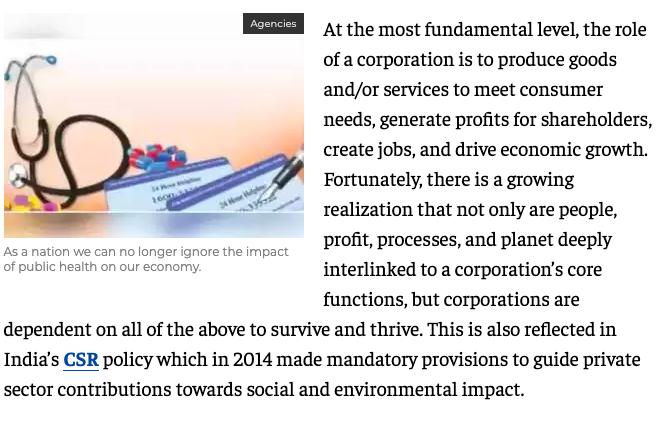Economic benefits of investing in WASH for corporates

At the most fundamental level, the role of a corporation is to produce goods and/or services to meet consumer needs, generate profits for shareholders, create jobs, and drive economic growth. Fortunately, there is a growing realization that not only are people, profit, processes, and planet deeply interlinked to a corporation’s core functions, but corporations are dependent on all of the above to survive and thrive. This is also reflected in India’s CSR policy which in 2014 made mandatory provisions to guide private sector contributions towards social and environmental impact.
A noteworthy fact in the CSR spends of the past 5 years is the growing emphasis on healthcare, WASH and environment sustainability (JICA Report). This bodes well for achieving India’s net zero goals by 2070. And given the rise in extreme climatic events in India over the last decade, I would go so far as to say that CSR investment in WASH and climate resilience has now become a necessity. We need only look back to the water shed moment of the Covid-19 pandemic to see the linkages between public health and hygiene and economic growth, when India lost approximately 52 lakh crores within a span of three years (2020-23), which is about 12% of the actual GDP (RBI report). Assuming a growth rate of 7.5%, India will take till 2034-35 to recover from these losses. As a nation we can no longer ignore the impact of public health on our economy, which in turn is impacted by our water and sanitation ecosystem. Inadequate WASH services and infrastructure can put a strain on public health budgets, loss of productivity, disruption of supply chains and also adversely change consumer behaviour and spending patterns. Conversely because of the WASH programs underway under Swachh Bharat Mission - many of the India Sanitation Coalition’s (ISC) programs with corporate partners was on hand washing and hygiene at schools and villages, making Covid related hygiene practices easier to implement.
